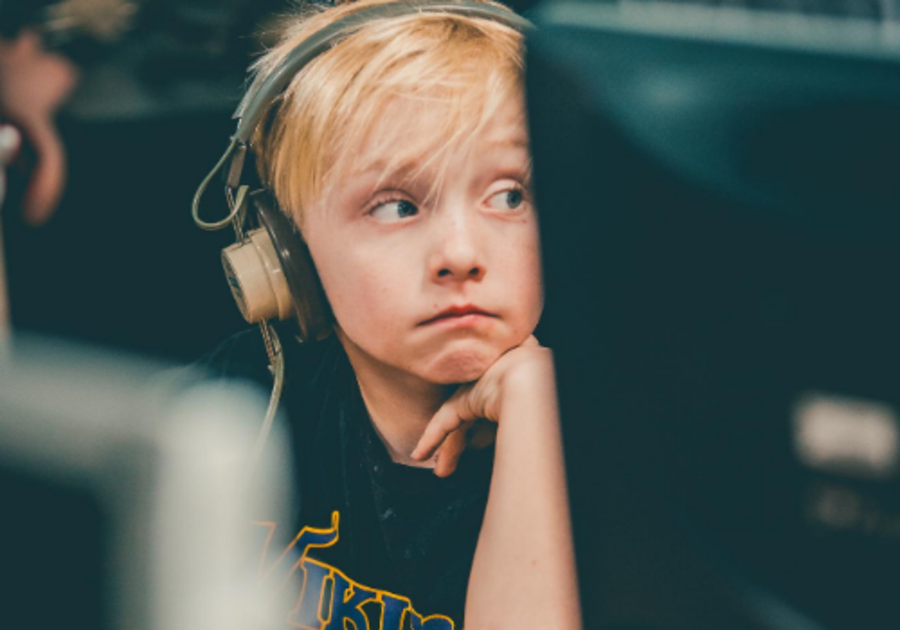If your house is anything like ours, you are living in an alternate universe driven by pandemic-induced survival. We’re all working, playing, learning, and living in the same space, all of the time. ALL OF IT. And most activities on our Groundhog Day-like schedules are taking place on an item most parents and caregivers have mixed feelings about on the best of days: A screen.

My husband and I are in constant dialogue about what’s happening with the devices in our house of 5 kids, balancing what we know from research (less screens) with what are kids missing by not being in school and with their friends (more screens for connection). Rules are bending like Gumby on his floor routine aiming for Olympic Gold. It’s also one of the most asked questions from parents of my tutoring clients: What should we be thinking about with screen time during a pandemic?
I curated the following tips and research to help guide our decisions as caregivers. Keeping in mind that no home is the same, no kid is the same, no parents or caregivers are the same, these are tips that can be adapted, adopted, or disregarded based on your own context. But hopefully this resource roundup will help you make the best decisions possible for your brood.
- Let’s start with a brief overview of the research, keeping in mind that we have never been in a pandemic before with the profound number of smartphones and devices in our homes. There weren’t iPads during the Spanish flu, so there isn’t great research about the long-term effects of what’s happening right now. But we can frame our thinking with general research and then shape it with our own contexts.
- A National Institutes of Health (NIH) study in 2018 showed that more than two hours of screens a day led to lower performance on thinking and language tests.
- Seven hours of screens a day can lead to the thinning of the brain’s cortex (which is responsible for critical thinking and reasoning skills).
- From the American Academy of Child and Adolescent Psychiatry: Kids 8-12 years old spent on average 4-6 hours on a screen, while teens can spend up to 9 hours a day (gulp).
- Increased screen time, especially with teens, can lead to greater emotional vulnerability (be mindful of the signs of depression and anxiety). A rise in the use of technology may be one of the causes of the rise of mental health issues (pre-COVID).
- And the recommended screen time for kids from the NIH: None for kids under 2 (we don’t necessarily follow this in my house), one hour of high-quality screens for kids 2-5, and “consistent limits” with kids 6 and over (they don’t make black and white guidelines).
- Not all screen time is equal. Watching hours of TikTok videos of dancing sock puppets and influencers discussing mascara choices is not the same quality as games that promote cooperative play, creativity, or problem-solving. We can’t lump screen time in the same bucket. Plus, without watching Youtube videos, how would any of us know how to fix our leaky bathroom faucet?
- Let’s call activities what they are and ditch the blanket term “screen time.” When we are using a device or screen, it could be for playtime, schooltime, worktime, friendtime, downtime, or even familytime. When we start framing our conversations with those more descriptive terms, we have a clearer idea of what we are actually doing with screens. We can use these terms to frame conversations with our kids about developing a healthy lifestyle, graphing how they are using their screens and reflecting on the results.
- We need some clear boundaries. What is okay for your family and what is not okay? What do we believe as a family about screens and dinnertime (because for some families, this works!)? What times should be tech-free times? What zones in the house are screen free (I always advocate for the bathroom to be a tech free zone with teenagers—I won’t go into the details but it keeps the bathroom line short!). And we do know from research that screens before bedtime are not conducive to great sleep, so I’d recommend thinking about those nighttime boundaries for the whole fam (including caregivers).
- We should discuss parental controls with kids. What expectations does your family have for parental controls on devices? We had a small mutiny in our house once when I changed the parental controls on Netflix without notifying the little people (which told me a lot about what they had been accessing!). Are random spot checks of phones okay? Are the grownups in your house able to check phones of all kids at night? Again, every house is different. And in my house, every caregiver has different comforts and beliefs as well.
- We need to cut ourselves some slack as parents and caregivers. This is the biggest and most important tip. Listen carefully: We are in a pandemic! Practice some grace as a caregiver and know that you are doing the best that you can. These are once-in-a-lifetime parenting conditions (hopefully). Know the context of your kids, your own anxiety levels, and don’t feel bad if you are bending the rules a little bit every day (or a lot). Do what you need to do and what works for your family. Be kind to yourself. And if that includes binge watching The Queens’ Gambit and more TikTok scrolling than you’re normally okay with, ditch the guilt. We have to take care of ourselves, too.
You can view an accompanying video to this article (and listen to it while washing dishes!) here.

Dr. Megan Allen, NBCT, is a National Board Certified Teacher, the 2010 Florida Teacher of the Year, and the developer of the Master of Arts in Teacher Leadership at Mount Holyoke College. She currently serves as the founder and Chief Learning Curator of Tailored Learning Supports (For Families) in Florence, MA, a personalized tutoring matching and support service to help children build confidence and find joy in learning. You can learn more about the services Megan and her team provide families nationwide here.



